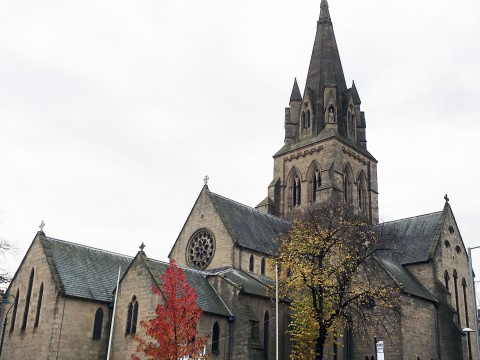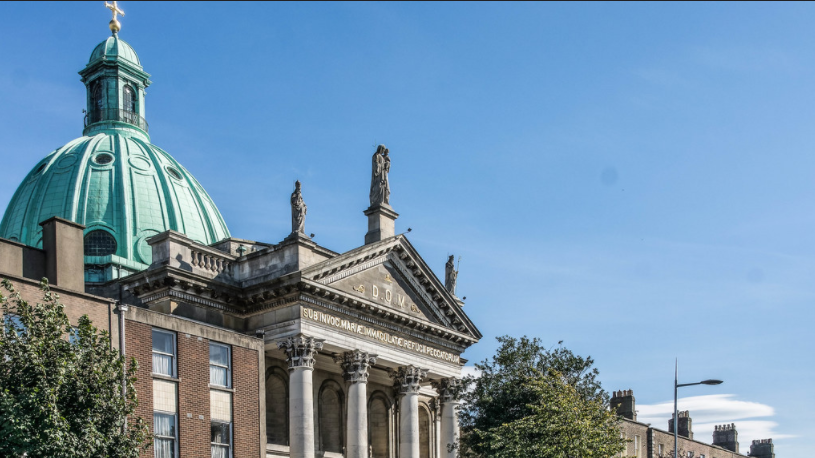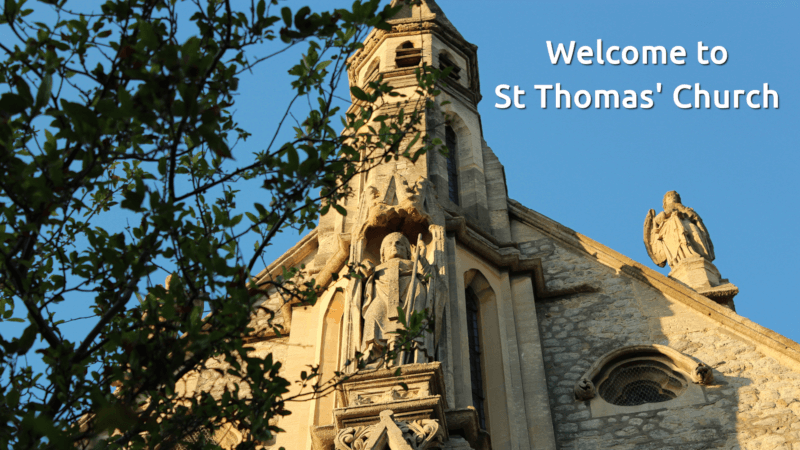Churches of the Day
Pictorial Thought for Today
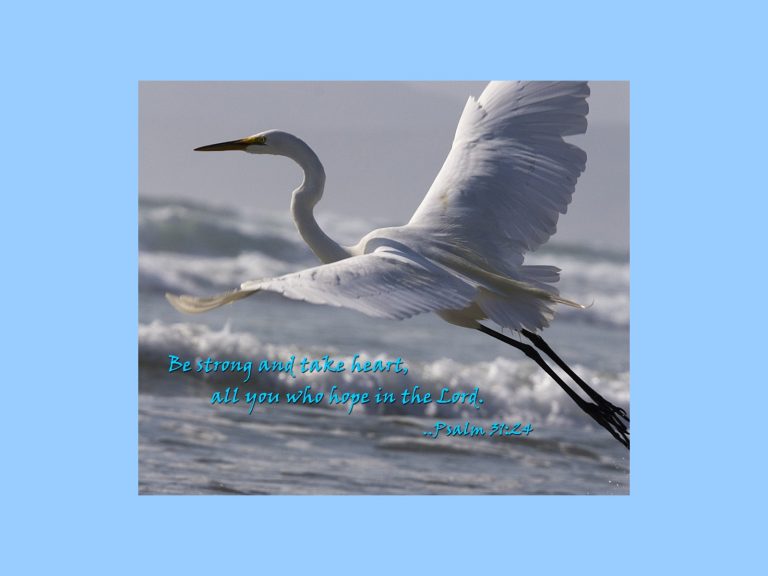
Apr 19 - Pope St Leo IX (1002-54)
Patrick Duffy outlines his life.
From Toul in Alsace
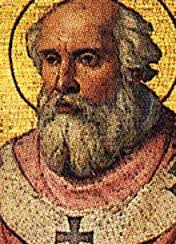 Bruno was born in 1002 at Toul on the River Moselle in Alsace. He became a deacon of the local diocese and he was given command of troops provided by the bishop to put down a Lombard rebellion, which he accomplished with success. While he was away, the bishop died and Bruno was chosen as his successor. He ruled the diocese for twenty years encouraging reform, discouraging clerical marriage, simony and nepotism.
Bruno was born in 1002 at Toul on the River Moselle in Alsace. He became a deacon of the local diocese and he was given command of troops provided by the bishop to put down a Lombard rebellion, which he accomplished with success. While he was away, the bishop died and Bruno was chosen as his successor. He ruled the diocese for twenty years encouraging reform, discouraging clerical marriage, simony and nepotism.Chosen as Pope
That he was a distant relative of the emperor Henry III was a factor in the choice of Bruno by an assembly at Worms to succeed Pope Damasus II when he died in 1048. But Bruno insisted on going to Rome as a pilgrim and was acclaimed by the Roman clergy and people. His choice of the name Leo was probably meant to evoke the memory of Pope St Leo the Great (440-461).
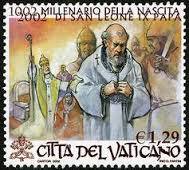 Travels and Reform
Travels and ReformOnce acclaimed, Leo determined to take the papacy out beyond Rome through Italy, Germany and France. He held reforming synods at Pavia, Cologne, Aachen, Mainz and Reims working with and through the kings to do away with simony and clerical marriage. At Reims he made a purge of bishops who had gained their sees by simony. Those who confessed were restored; others were excommunicated or deposed. He also enforced orthodox doctrine condemning Berengarius of Tours (999-1088) for heretical teaching on the Eucharist.
Assistants and Advisors
Pope Leo gathered round him an international body of experts and activists that included St Peter Damian (See 21st February), Humbert of Moyenmoutier, later cardinal and his delegate to Constantinople, Abbot Hugh of Cluny (See 29th April) and the energetic Roman monk Hildebrand of Savona, later to become Pope St Gregory VII (1073-85) (See 25th May).
Struggle with the Normans
However, he was less successful in dealing with the Normans who had invaded southern Italy. In fact although he had an army of German and Italian volunteers, he was defeated and captured by the Normans in June 1053 at Civitella and detained in captivity at Benevento during the winter of 1053-4.
Dispute with Patriarch Michael Cerularius of Constantinople
Because on his intervention in the south of Italy where the Byzantine East had many churches, Leo IX came under attack from Michael Cerularius, Patriarch of Constantinople, who accused Rome of heresy, especially because of its use of unleavened bread for the Eucharist. Leo replied, citing the Donation of Constantine claiming that the Pope had both an earthly and a heavenly authority. The Patriarch rejected the claims of papal primacy, and subsequently the Catholic Church was split in two in the Great East-West Schism of 1054 that lasts till today.
Leo's Death and Influence
But Leo did not live to see the full outcome of that conflict. The campaign against the Normans took its toll on him. He returned to Rome a sick man and died piously on April 9, 1054. Many miraculous cures were attributed to him and he was acclaimed a saint. His military involvement was criticised by St Peter Damian, but he did set in train a programme to end simony, clerical marriage and lay investiture that was later brought forward by Pope St Gregory VII.
Friday, Third Week of Easter
Paul is converted by the Risen Lord on the Road to Damascus.
The same Jesus is present in the Eucharist where he is our pledge of eternal communion with the Father.
FIRST READING
A reading from the Book Acts of the Apostles 9:1-20
This man is my chosen instrument to bring my name before pagans.
Saul was still breathing threats to slaughter the Lord's disciples. He had gone to the high priest and asked for letters addressed to the synagogues in Damascus, that would authorise him to arrest and take to Jerusalem any followers of the Way, men or women, that he could find.
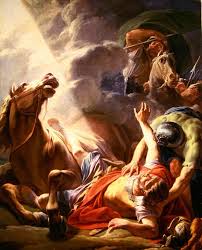 Suddenly, while he was travelling to Damascus and just before he reached the city, there came a light from heaven all round him. He fell to the ground, and then he heard a voice saying, '
Suddenly, while he was travelling to Damascus and just before he reached the city, there came a light from heaven all round him. He fell to the ground, and then he heard a voice saying, 'Saul, Saul, why are you persecuting me?'
'Who are you, Lord?' he asked, and the voice answered,
'I am Jesus, and you are persecuting me.
Get up now and go into the city, and you will be told what you have to do.'
The men travelling with Saul stood there speechless,
for though they heard the voice they could see no one.
Saul got up from the ground, but even with his eyes wide open he could see nothing at all, and they had to lead him into Damascus by the hand. For three days he was without his sight, and took neither food nor drink.
A disciple called Ananias who lived in Damascus had a vision in which he heard the Lord say to him, 'Ananias!'
When he replied, 'Here I am, Lord',
the Lord said,
'You must go to Straight Street and ask at the house of Judas for someone called Saul, who comes from Tarsus.
At this moment he is praying, having had a vision of a man called Ananias coming in and laying hands on him
to give him back his sight.'
When he heard that, Ananias said,
'Lord, several people have told me about this man and all the harm he has been doing to your saints in Jerusalem.
He has only come here because he holds a warrant from the chief priests to arrest everybody who invokes your name.'
The Lord replied,
'You must go all the same, because this man is my chosen instrument to bring my name
before pagans and pagan kings and before the people of Israel;
I myself will show him how much he himself must suffer for my name.'
Then Ananias went. He entered the house, and at once laid his hands on Saul and said,
'Brother Saul, I have been sent by the Lord Jesus who appeared to you on your way here
so that you may recover your sight and be filled with the Holy Spirit.'
Immediately it was as though scales fell away from Saul's eyes and he could see again. So he was baptised there and then, and after taking some food he regained his strength. After he had spent only a few days with the disciples in Damascus, he began preaching in the synagogues, 'Jesus is the Son of God.'
The Word of the Lord. Thanks be to God
Responsorial Psalm Ps 116
Response Go out to the whole world; proclaim the Good News.
Or Alleluia!
1. O praise the Lord, all you nations, acclaim him all you peoples! Response
2. Strong is his love for us; he is faithful forever. Response
Gospel Acclamation Lk 24:46.26
Alleluia, Alleluia!
It was ordained that the Christ should suffer and rise from the dead,
and so enter into his glory.
Alleluia!
or Jn 6: 56
Alleluia, Alleluia!
'He who eats my flesh and drinks my blood lives in me and I live in him', says the Lord.
Alleluia!
GOSPEL
The Lord be with you. And with your spirit
A reading from the holy Gospel according to John 6:52-59 Glory to you, O Lord
For my flesh is real food and my blood is real drink.
The Jews started arguing with one another:
'How can this man give us his flesh to eat?' they said.
Jesus replied:
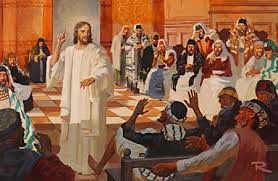 'I tell you most solemnly, if you do not eat the flesh of the Son of Man and drink his blood, you will not have life in you.
'I tell you most solemnly, if you do not eat the flesh of the Son of Man and drink his blood, you will not have life in you.Anyone who does eat my flesh and drink my blood has eternal life,
and I shall raise him up on the last day.
For my flesh is real food and my blood is real drink.
He who eats my flesh and drinks my blood lives in me and I live in him.
As I, who am sent by the living Father, myself draw life from the Father,
so whoever eats me will draw life from me.
He taught this doctrine at Capernaum, in the synagogue.
The Gospel of the Lord. Praise to you, Lord Jesus Christ
_________________________
Gospel Reflection Friday, Third Week of Easter John 6:52-59
The question that people ask in today’s gospel reading is a perfectly understandable one, ‘How can this man give us his flesh to eat?’ The notion of eating’s someone’s flesh is abhorrent. Yet, Jesus does not qualify what he says but, rather, he goes on to say something even more shocking. He not only calls on people to eat his flesh but to drink his blood. It is evident that Jesus is not speaking literally. His way of speaking reflects what he said at the last supper where, having taken, blessed and broken bread, he gave it to his disciples and said, ‘This is my body’. Then, having taken and blessed wine, he gave it to his disciples and said, ‘This is my blood’.
Jesus identified himself, body and blood, flesh and blood, with the elements of bread and wine. He went on to instruct his disciples at the Last Supper to ‘do this in memory of me’. Ever since, the church has repeated the actions and words of Jesus at the last supper. In today’s first reading we have the dramatic story of the call of Paul. Paul will later declare in his first letter to the Corinthians, ‘The cup of blessing that we bless, is it not a communion in the blood of Christ?
The bread that we break, is it not a communion in the body of Christ?’
This was the faith of the early church and of the church ever since. The Lord wishes to enter into communion with us in a very profound way at the Eucharist so that, in the words of the gospel reading, we can draw life from him. The Eucharist is a celebration of life. We are then sent out from the Eucharist to nurture and protect life in all its forms.
__________________________________
The Scripture Readings are taken from The Jerusalem Bible, published 1966 by Darton, Longman & Todd Ltd. and used with the permission of the publishers. http://dltbooks.com/
The Scripture Reflection is made available with our thanks from his book Reflections on the Weekday Readings 2024: The Word is near to you, on your lips and in your heart by Martin Hogan and published by Messenger Publications 2022/23, c/f www.messenger.ie/bookshop/
___________________________________
CÉAD LÉACHT
Sliocht as Leabhar Gníomhartha na nAspal 9:1-20
Is é sin an duine atá tofa agamsa chun m’ainm a thabhairt i láthair na bpágánach.
Ó bhí Sól ag bagairt báis ar dheisceabail an Tiarna. Chuaigh sé go dtí an t-ardsagart ag lorg litreacha uaidh le tabhairt chun na sionagóg i nDamaisc i dtreo, cibé duine dá bhfaigheadh sé ann, fear nó bean, a lean an bealach, go ndéanfadh sé iad a ghabháil agus a thabhairt ar ais go Iarúsailéim.
 Bhí sé ar an mbóthar ann agus é ag druidim le Damaisc nuair a las solas ón spéir ina thimpeall de phreib. Thit sé chun talaimh agus chuala sé an guth á rá leis:
Bhí sé ar an mbóthar ann agus é ag druidim le Damaisc nuair a las solas ón spéir ina thimpeall de phreib. Thit sé chun talaimh agus chuala sé an guth á rá leis:“A Shóil, a Shóil, cén fáth a bhfuil tú do mo ghéarleanúint?”
“Cé thú féin, a Thiarna?” d’fhiafraigh Sól.
D’fhreagair an guth:
“Is mise Íosa, an té a bhfuil tú á ghéarleanúint.
Ach éirigh i do sheasamh, gabh isteach sa chathair agus déarfar leat cad is déanta duit.”
Na fir a bhí ag taisteal leis, rinneadh staic díobh: bhí an guth le cloisteáil acu ach gan duine le feiceáil. D’éirigh Sól den talamh, ach nuair a d’oscail sé na súile ní raibh aon léas radhairc aige. Rug siad ar láimh air agus sheol isteach sa chathair é. Agus bhí sé ar feadh trí lá gan radharc agus gan greim ná bolgam a bhlas.
Bhí, i nDamaisc, deisceabal darbh ainm Anainias agus labhair an Tiarna in aisling leis:
“A Anainias,” ar sé.
“Teacht, a Thiarna,” d’fhreagair Anainias.
“Éirigh,” arsa an Tiarna leis, “agus gluais leat go dtí an tSráid Dhíreach mar a thugtar uirthi, agus loirg i dteach Iúdáis fear ó Tharsas arb ainm dó Sól. Tá sé ag guí ann agus chonaic sé in aisling fear darbh ainm Anainias ag teacht isteach chuige agus ag leagan a lámh air chun go mbeadh a radharc ar ais aige.”
Ach d’fhreagair Anainias:
“A Thiarna, chuala mé iomrá ar an bhfear seo óna lán daoine agus ar a bhfuil d’olc déanta aige ar an bpobal naofa in Iarúsailéim, agus anseo féin tá údarás aige ó na hardsagairt gach duine dá nglaonn ar d’ainmse a ghabháil.”
“Gluais leat,” arsa an Tiarna leis, “mar is é sin an duine atá tofa agamsa chun m’ainm a thabhairt i láthair na bpágánach agus na ríthe agus i láthair chlann Iosrael. Taispeánfaidh mise dó a bhfuil le fulaingt aige ar son m’ainmse.”
D’imigh Anainias leis, agus ar dhul isteach sa teach dó leag sé a lámha air, á rá:
“A Shóil, a bhráthair, is é an Tiarna a sheol chugat mé – an Íosa a thaispeáin é féin duit ar do bhealach anseo – chun go mbeadh do radharc arís agat agus go líonfaí den Spiorad Naomh thú.” Agus de phreib thit mar a bheadh screamh dá shúile agus tháinig a radharc arís dó; agus ar éirí dó ina sheasamh, baisteadh é. Agus tar éis dó rud a ithe tháinig a neart arís ann. D’fhan Sól ar feadh tamaill leis na deisceabail i nDamaisc. Thosaigh sé láithreach ag fógairt sna sionagóga gurb é Íosa mac Dé.
Briathar an Tiarna Buíochas le Dia
Salm le Freagra Sm 116
Freagra Imígí faoin domhan uile agus fógraígí an soiscéal don chruthaíocht uile.
Malairt freagra Alleluia!
1. Molaigí an Tiarna, a chiníocha uile;
moladh na náisiúin go léir é. Freagra
2. Óir is daingean é go deimhin, a bhuanghrá dúinn;
maireann a dhílseacht go brách. Freagra
SOISCÉAL
Go raibh an Tiarna libh. Agus le do spiorad féin
Sliocht as an Soiscéal naofa de réir Naomh Eoin 6:52-59 Glóir duit, a Thiarna
Is bia go fíor mo chuid feola agus is deoch go fíor mo chuid fola.
San am sin bhí na Giúdaigh ansin ag aighneas le chéile á rá:
“Conas is féidir leis an duine seo a fheoil a thabhairt dúinn le hithe?”
Dúirt Íosa leo:
Amen, Amen, a deirim libh, mura n-íosfaidh sibh feoil Mhac an Duine,
agus a chuid fola a ól, ní bheidh beatha agaibh ionaibh.
 An té a itheann m’fheoil agus a olann m’fhuil,
An té a itheann m’fheoil agus a olann m’fhuil,tá an bheatha shíoraí aige, agus tógfaidh mé suas é an lá deireanach.
Is bia go fíor mo chuid feola agus is deoch go fíor mo chuid fola.
An té a itheann m’fheoil agus a ólann m’fhuil cónaíonn sé ionamsa agus cónaímse ann. Amhail mar a chuir an tAthair beo mise uaidh,agus mar is beo mise tríd an Athair,
mar an gcéanna, an té a itheann mise, mairfidh sé tríom.
Is é seo an t-arán a tháinig anuas ó neamh.
Ní ionann is an manna ar ith bhur n-aithreacha é agus go bhfuil siad marbh;
an té a itheann an t-arán seo, mairfidh sé go deo.”
Dúirt sé na nithe seo i gCafarnáum agus é ag teagasc sa tsionagóg.
Soiscéal an Tiarna. Moladh duit, a Chriost
.
AN BÍOBLA NAOFA
© An Sagart
Fourth Sunday of Easter
Day of Prayer for Vocations
This is Good Shepherd Sunday, a day of special prayer for vocations to the work of service in the Church.
Christ is the good shepherd who has given his life for his sheep. Salvation is to be found in no one else but him.
He is the one shepherd of one flock. He has laid down his life that all might be saved.
FIRST READING
A reading from the Book Acts of the Apostles 4:8.12 .
This is the only one by which we can be saved.
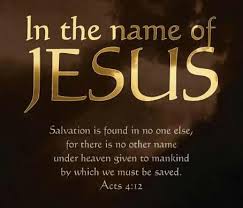 Filled with the Holy Spirit, Peter said:
Filled with the Holy Spirit, Peter said:'Rulers of the people, and elders! If you are questioning us today about an act of kindness to a cripple, and asking us how he was healed, then I am glad to tell you all, and would indeed be glad to tell the whole people of Israel, that it was by the name of Jesus Christ the Nazarene, the one you crucified, whom God raised from the dead, by this name and by no other that this man is able to stand up perfectly healthy, here in your presence today. This is the stone rejected by you the builders, but which has proved to be the keystone. For of all the names in the world given to men, this is the only one by which we can be saved.'
The Word of the Lord. Thanks be to God
Responsorial Psalm Ps 117
Response The stone which the builders rejected has become the corner stone.
or Alleluia!
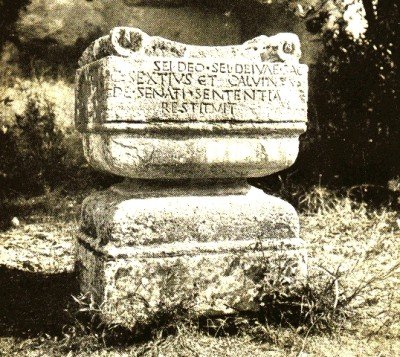 1. Give thanks to the Lord for he is good, for his love has no end.
1. Give thanks to the Lord for he is good, for his love has no end.It is better to take refuge in the Lord than to trust in men:
it is better to take refuge in the Lord than to trust in princes. Response
2. I will thank you for you have given answer and you are my saviour.
The stone which the builders rejected has become the corner stone.
This is the work of the Lord, a marvel in our eyes. Response
3. Blessed in the name of the Lord is he who comes.
We bless you from the house of the Lord;
I will thank you for you have given answer and you are my saviour.
Give thanks to the Lord for he is good; for his love has no end. Response
SECOND READING
A reading from the first letter of St John 3:1-2
We shall see God as he really is.
Think of the love that the Father has lavished on us,
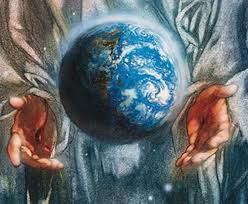
by letting us be called God's children; and that is what we are.
Because the world refused to acknowledge him,
therefore it does not acknowledge us.
My dear people, we are already the children of God
but what we are to be in the future has not yet been revealed;
all we know is, that when it is revealed we shall be like him
because we shall see him as he really is.
The Word of the Lord. Thanks be to God
Gospel Acclamation Jn 10: 14
Alleluia, alleluia!
I am the good shepherd; I know my own and my own know me
Alleluia!
GOSPEL
The Lord be with you And with your spirit.
A reading from the holy Gospel according to John 10:11-18 Glory to you, O Lord
The good shepherd lays down his life for his sheep.
Jesus said:
'I am the good shepherd: the good shepherd is one who lays down his life for his sheep.
The hired man, since he is not the shepherd and the sheep do not belong to him,
abandons the sheep and runs away as soon as he sees a wolf coming,
and then the wolf attacks and scatters the sheep;
this is because he is only a hired man and has no concern for the sheep.
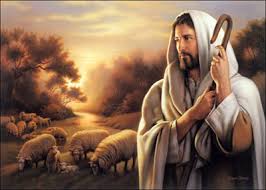
I am the good shepherd; I know my own and my own know me,
just as the Father knows me and I know the Father;
and I lay down my life for my sheep.
And there are other sheep I have that are not of this fold, and these I have to lead as well.
They too will listen to my voice, and there will be only one flock, and one shepherd.
The Father loves me, because I lay down my life in order to take it up again.
No one takes it from me; I lay it down of my own free will,
and as it is in my power to lay it down, so it is in my power to take it up again;
and this is the command I have been given by my Father.'
The Gospel of the Lord. Praise to you, Lord Jesus Christ.
____________________________
For homily resources for this Sunday's Gospel click here: https://www.catholicireland.net/sunday-homily/
Taken from THE JERUSALEM BIBLE, published and copyright 1966 by Darton, Longman and Todd Ltd and Doubleday, a division of Random House Inc, and used by permission of the publishers.
Sliocht as Leabhar Gníomhartha na nAspal 4:8-12
Níl slálú i neach ar bith eile.
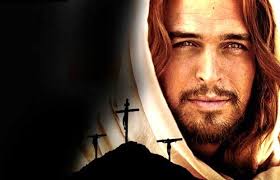 Dúirt Peadar leo agus é lán den Spiorad Naomh:
Dúirt Peadar leo agus é lán den Spiorad Naomh:“A cheannairí an phobail,” ar seisean, “agus a sheanóirí, más mar gheall ar mhaith a dhéanamh do dhuine easlán atáimidne dár scrúdú inniu agus mar gheall ar an tslí inar leigheasadh é, bíodh a fhios agaibhse go léir agus ag pobal Iosrael ar fad gur in ainm Íosa Críost Nazórach – an fear a chéas sibhse ar chrois ach ar thóg Dia ó mhairbh é – gur ina ainm sin atá an duine seo ina sheasamh os bhur gcomhair ina shláinte. Is é seo ‘an chloch dar dhiúltaigh sibhse, na saoir, agus a ndearnadh di ceann an chúinne,’ níl slánú le fáil i nduine ar bith eile mar níl aon ainm eile faoin spéir dár tugadh do dhaoine lena dtig linn slánú a bhaint amach.”
Briathar an Tiarna Buíochas le Dia
Salm le Freagra Sm 117
Freagra An chloch dár dhiúltaigh na saoir, rinne ceann an chúinne di.
Mafairt Freagra Alleluia!
 I. Tugaigí buíochas don Tiarna toisc gur maith é: óir maireann a ghrá de shío r.
I. Tugaigí buíochas don Tiarna toisc gur maith é: óir maireann a ghrá de shío r.
Is fearr dul i muinín an Tiarna, ná bheith ag brath ar an duine.
Is fearr dul i muinín an Tiarna, ná bheith ag brath ar fhlatha. Freagra
2. Gabhaim buíochas leat de bhrí gur éist tú liom agus gur tú mo shlánaitheoir.
An chloch dár dhiúltaigh na saoir, rinne ceann an chúinne di.
Is é an Tiarna a rinne é seo, agus is éachtach linne é. Freagra
3. Is beannaithe in ainm an Tiarna an té atá ag teacht. Beannaimid sibh as teach an Tiarna;
gabhaim buíochas leat de bhrí gur éist tú liom agus gur tú mo shlánaitheoir.
Tugaigí buíochas don Tiarna toisc gur maith é: maireann a ghrá de shíor. Freagra
DARA LÉACHT
Sliocht as an chéadLitir Naomh Eoin 3:1-2
Feícfimid Día mar atá sé.
 A clann ionúin, breathnaígí cad é mar ghrá a thug an tAthair dúinn!
A clann ionúin, breathnaígí cad é mar ghrá a thug an tAthair dúinn!go nglaofaí clann Dé orainn, agus is amhlaidh sinn.
Sé an fáth nach n-aithníonn an saol sinne mar nár aithin sé eisean.
Chairde cléibh, is clann Dé cheana féin sinn,
agus níor foilsíodh fós cé mar a bheimid;
ach nuair a fhoilseofar é,
is feasach sinn go mbeimid ina chosúlachtsan,
mar go bhfeicfimid é mar atá sé.
Briathar an Tiarna Buíochas le Dia
Alleluia Véarsa Eo 10: 14
Alleluia, Alleluia
Is mise an t-aoire maith,' a deir an Tiarna.
AithnÍm mo chaoirigh féin, agus aithníonn mo chaoirigh féin mé'
Alleluia!
SOISCÉAL
Go raibh an Tiarna libh. Agus le do spiorad féin
Sliocht as Soiscéal naofa de réir Naomh Mhatha, Eoin 10:11-18 Glóir duit, a Thiarna.
Tugann an t-aoire maith a bheatha ar son a chaorach.
San am sin dúirt Íosa
Mise an sáraoire, Tugann an sáraoire a bheatha ar son a chaorach.
An fostúch, nach bhfuil ina aoire, agus nach leis féin na caoirigh,
feiceann sé an mac tíre ag teacht, agus fágann na caoirigh agus teitheann, agus fuadaíonn an mac tíre iad agus scaipeann.
[Teitheann sé] de bhrí gur fostúch é, agus gur cuma leis mar gheall ar na caoirigh.
Ach is mise an sáraoire,
 agus aithním mo chuid féin,
agus aithním mo chuid féin,agus aithníonn mo chuid féin mé, faoi mar a aithníonn an tAthair mé,
agus mar a aithnímse an tAthair.
Agus tugaim mo bheatha ar son mo chaorach. Tá caoirigh eile agam chomh maith,
nach den chró seo iad.
Ní foláir dom iad sin a thabhairt chomh maith, agus éistfidh siad le mo ghlór,
agus beidh aon tréad amháin ann, agus aon aoire amháin.
Mar gheall air seo atá grá ag an Athair dom mar go bhfuilim ag tabhairt mo bheatha uaim, chun go nglacfainn chugam arís í.
Níl aon duine á tógáil uaim; is uaim féin a thugaim uaim í,
agus tá sé ar mo chumas í a thabhairt uaim agus tá sé ar mo chumas í a ghabháil chugam arís.
Sin í an aithne a fuair mé ó m’Athair.”
Soiscéal an Tiarna. Moladh duit, a Chriost
AN BÍOBLA NAOFA
© An Sagart
************************************
Machtnamh ar Bhriathar Dé dia 4ú Domhnach na Cásca
Caidreamh pearsanta
Léiríonn íomhá an aoire, an nádúr pearsanta atá sa ghaol idir Íosa agus a lucht leanúna. Léiríonn sé an dlúthchúram pearsanta a dhéanann an t-aoire leis na caoirigh. Tá an t-aoire imithe ag lorg aon chaora amháin a d'imigh ar strae, agus nuair a fuair sé é, d'iompair sé ar a ghualainn é ar ais go dtí an tréad. Tá dlúthbhaint idir an tréadaí agus an caora seo. Aithníonn sé a chuid féin mar a n-aithníonn siad é, díreach mar a aithníonn an tAthair é agus go n-aithníonn Sé an tAthair. Tá Íosa ag rá go bhfuil a chaidreamh an-phearsanta san lena Athair neamhaí cosúil leis an gcaidreamh atá aige do gach duine againn. Tá go leor ann chun machtnamh air. I dtuairim an Tiarna ní rud beag i measg slua sinn, caillte i lár an aonaigh mar a déarfá. Ar bhealach nach dtuigfimid, tá aithne ag an Tiarna ar gach duine againn de réir ainm. Is mór aige sinn ar bhealach pearsanta agus iarann sé orainn teagmháil a dhéanamh leis ar bhealach pearsanta, freisin.
Pádraig Ó Rúairí, cp,
Sliabh Argus,
Átha Cliath.
********************************************


